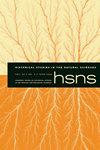Gaia’s Tissue
IF 0.3
3区 哲学
Q2 HISTORY & PHILOSOPHY OF SCIENCE
引用次数: 0
Abstract
Essay| September 01 2023 Gaia’s Tissue Mathias Grote Mathias Grote Institut für Geschichtswissenschaften, Humboldt-Universität zu Berlin, Unter den Linden 6, 10099 Berlin / Abteilung Geschichtswissenschaft, Universität Bielefeld, Postfach 100135, 33501 Bielefeld, Germany mathias.grote@hu-berlin.de Search for other works by this author on: This Site PubMed Google Scholar mathias.grote@hu-berlin.de Historical Studies in the Natural Sciences (2023) 53 (4): 434–443. https://doi.org/10.1525/hsns.2023.53.4.434 Views Icon Views Article contents Figures & tables Video Audio Supplementary Data Peer Review Share Icon Share Facebook Twitter LinkedIn Email Tools Icon Tools Get Permissions Cite Icon Cite Search Site Citation Mathias Grote; Gaia’s Tissue. Historical Studies in the Natural Sciences 1 September 2023; 53 (4): 434–443. doi: https://doi.org/10.1525/hsns.2023.53.4.434 Download citation file: Ris (Zotero) Reference Manager EasyBib Bookends Mendeley Papers EndNote RefWorks BibTex toolbar search Search Dropdown Menu toolbar search search input Search input auto suggest filter your search All ContentHistorical Studies in the Natural Sciences Search In the spring of 2020, when the shelves of hygiene products were emptying, a paradoxical product fell into my hands: a probiotic hand sanitizer. While the product’s claim to differentiate between bad bugs and good ones added to it cannot be discussed here, the mélange certainly embodied a collective ambivalence about microbes. Had we not learned in the preceding years that microbes were not our foes but rather partners in health (microbiome, phage therapy) and nutrition (fermentation), as well as in planetary homeostasis, such as through oceanic photosynthesis? In early 2020, these insights faced a sudden retreat. Yet, just three years distant, it seems safe to say that the pandemic did not elicit a wholesale backlash in humanity’s relationship to microbes, but rather, that the sea change revealing them as ubiquitous, as partners, if not as constituents of multitude selves seems to have prevailed. This essay explores this sea change... You do not currently have access to this content.盖亚的组织
论文| 2023年9月1日盖亚组织Mathias Grote Mathias Grote Institut f r Geschichtswissenschaften, Humboldt-Universität zu Berlin, Unter den Linden 6, 10099 Berlin / Abteilung Geschichtswissenschaft, Universität Bielefeld, Postfach 100135, 33501 Bielefeld, Germany mathias.grote@hu-berlin.de搜索作者的其他作品:本网站PubMed Google Scholar mathias.grote@hu-berlin.de自然科学历史研究(2023)53(4):434-443。https://doi.org/10.1525/hsns.2023.53.4.434查看图标查看文章内容图表和表格视频音频补充数据同行评审分享图标分享Facebook Twitter LinkedIn电子邮件工具图标工具获得权限引用图标引用搜索网站引文马蒂亚斯格罗特;盖亚的组织。自然科学历史研究2023年9月1日;53(4): 434-443。doi: https://doi.org/10.1525/hsns.2023.53.4.434下载引文文件:Ris (Zotero)参考文献管理器EasyBib Bookends Mendeley Papers EndNote RefWorks BibTex工具栏搜索搜索下拉菜单工具栏搜索搜索输入搜索输入自动建议过滤您的搜索所有内容自然科学搜索中的历史研究2020年春天,当卫生用品的货架清空时,一个矛盾的产品落入了我的手中:一种益生菌洗手液。虽然该产品声称可以区分添加在其中的有害细菌和有益细菌,但这里无法讨论,但该产品确实体现了一种对微生物的集体矛盾心理。在过去的几年里,我们难道没有认识到微生物不是我们的敌人,而是健康(微生物组,噬菌体治疗)和营养(发酵)以及行星稳态(例如通过海洋光合作用)的伙伴吗?在2020年初,这些见解面临着突然的退缩。然而,就在三年前,似乎可以肯定地说,这场大流行并没有引起人类与微生物关系的全面反弹,相反,表明它们无处不在的巨大变化,即使不是作为众多自我的组成部分,也是作为伙伴,似乎已经占了上风。这篇文章探讨了这一巨大变化……您目前没有访问此内容的权限。
本文章由计算机程序翻译,如有差异,请以英文原文为准。
求助全文
约1分钟内获得全文
求助全文
来源期刊

Historical Studies in the Natural Sciences
社会科学-科学史与科学哲学
CiteScore
1.00
自引率
0.00%
发文量
24
审稿时长
>12 weeks
期刊介绍:
Explore the fascinating world of Historical Studies in the Natural Sciences, a journal that reveals the history of science as it has developed since the 18th century. HSNS offers in-depth articles on a wide range of scientific fields, their social and cultural histories and supporting institutions, including astronomy, geology, physics, genetics, natural history, chemistry, meteorology, and molecular biology. Widely regarded as a leading journal in the historiography of science and technology, HSNS increased its publication to five times per year in 2012 to expand its roster of pioneering articles and notable reviews by the most influential writers in the field.
 求助内容:
求助内容: 应助结果提醒方式:
应助结果提醒方式:


